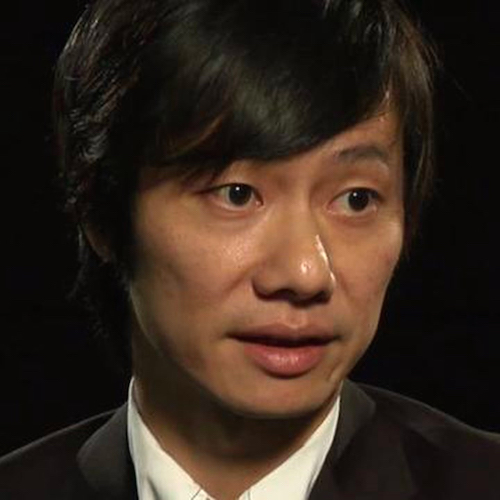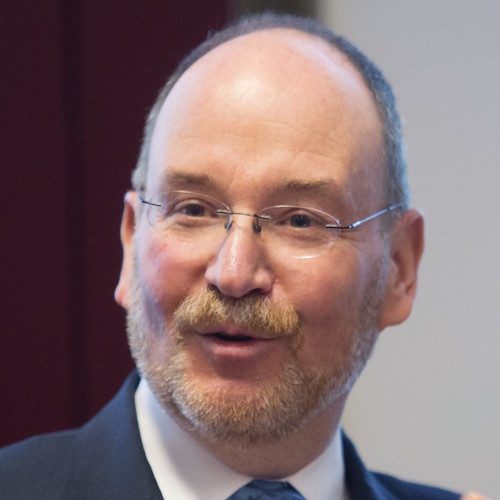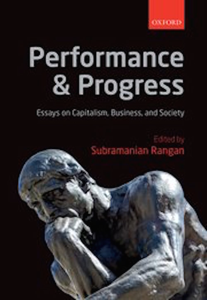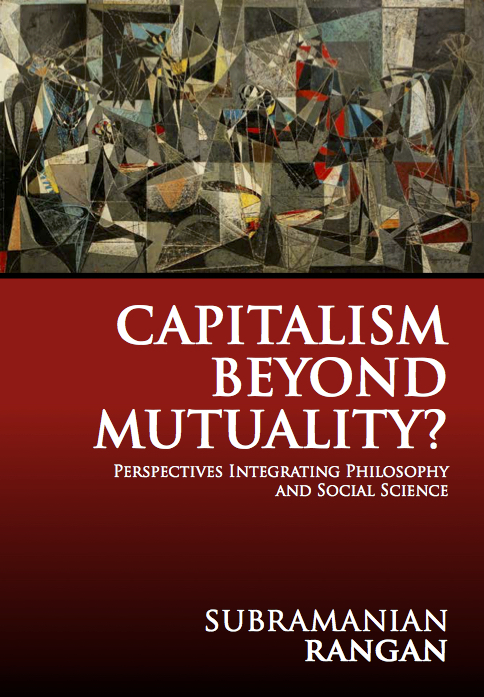If science must be a force for truth, business must be a force for good.
The Issues
Since knowledge differs from one individual to another and therefore the market prices do not reflect all the knowledge in the economy, the usual arguments for the efficiency of the price system are incompletely valid. It is necessary to add moral codes of behavior to permit markets to function, and it is essential to study how they might best be created and commonly accepted.
How can we replace the simplistic and outdated picture of rationality that undergirds neoliberalism?
Just as regulation helps as a coordinating mechanism for addressing enterprise errors of commission (such as the use of child labor, release of unsafe products, publication of unaudited results), what models and methods might help enterprises coordinate better (and avoid a "sucker’s payoff") on errors of omission (such as establishing apprenticeship and mentoring for non-college youth; forbearing on excessive branding and advertising that provokes immoderate and positional consumption; organizing to pay adult workers a living rather than minimum wage when the latter is tenuously low; …)?
We need good public services provided by the state as well as a well functioning market economy. The two together can yield great social achievements that neither can do on its own. The market economy makes easy use of the profit motive, but it also needs, as Adam Smith argued, mechanisms for accountability and the development of a sense of personal responsibility.
ES&G or ES vs G?: Does corporate governance help or hurt environment and society?
Existing research on corporations still tends to center on how to maximize profit, but in the face of mounting complex societal problems, we need research to understand how organizations can effectively pursue social and commercial objectives at the same time; we cannot assume that what we know about how to maximize profit applies uniformly to how to pursue joint financial and social goals.
How do we enable workers to evolve their skill sets as rapidly as do the technologies with which they work?
How can information technology and low-cost capital equipment be used to create more democratic and human-scale enterprises?
It would be useful to analyze the impact of the current global decline in the legitimacy of extreme neoliberal lines of thought on the development of organizational structures in economy, state and society.
I am hopeful that future research will help us understand how to solve problems of global coordination that disproportionately burden the powerless and the poor (problems such as climate change). Such solutions require a village -- we need to think about economic and political structures, but also about individual motivation and behavior and how the two interact.
How should we conceive of corporations and states and what stable arrangement ought to govern their mutual rights and responsibilities under conditions of globalization?
How can the value of efficiency, promoted by the marketplace, be pursued without undermining other values such as fairness, equality, and kindness?
Social critics lament a persistent tendency for market economies to favor private consumption over public consumption, which they attribute to the pernicious influence of advertising. This imbalance, however, is more plausibly rooted in a fundamental cognitive error: People believe, mistakenly, that higher taxes would create hardships akin to most other forms of declines in disposable income. But unlike higher taxes, which affect all income peers similarly and hence have no effect on relative purchasing power, most of the income reductions that people actually experience are individual-specific. People resist higher public spending because they mistakenly believe that the higher taxes necessary to pay for it will make it harder for them to buy the private goods they want.
Given that we have now good reason to think that capitalism is in a crisis (see for instance recent work by Thomas Piketty or Robert Putnam), what can we learn from the various branches of socialism to make the system better, or perhaps even get a new system?
Few things matter more than education. Yet education may be one of the few human endeavors where our sense of the "good old days" is accurate. Has the tide of progress left education behind? If so, why?
How can corporate executives be motivated to focus on promoting social progress through their products, services, and production technologies?
How can the great power of capitalism be used to address issues of abject poverty around the world?
What can political models of government teach us about the successful integration of moral and economic values in business organizations?
Global capitalism can, in principle, provide the resources needed for all members of the human population to have serious chances of leading fulfilling lives (assuming that the entire world undergoes the demographic transition). Currently, however, a large fraction of the population suffers from the skewed distribution of those resources. How can we maintain productivity while ensuring an equitable distribution of the resources people need?
The free-market economic system, based on classical economic theory, has served the world well. But it has also shown its limits and deficiencies. We need more work now to support the changes that will make our woldwide economic system more sustainable and socially more acceptable.
Shaping a better future through Digital Transformation.
As business leaders I sincerely believe that we need to evolve in the way we do business from the traditional concept of capitalism maximizing only shareholder value to a new form of capitalism, one that shares the value we create among all stakeholders. Will business that adopt this way of doing business have a superior financial performance in the long run?
While we have a reasonable understanding of how our market-oriented economic system works in society, I would like to see us address how this system can best work for society.
Capitalism cannot be restricted to boardrooms. The true wealth of a nation is measured by an educated populace, a fair society and the freedom to ideate.
The Books
Performance & Progress: Essays on Capitalism, Business, and Society
- Moves beyond case studies and CSR and reviews core conceptual, theoretical, and philosophical issues
- Multidisciplinary; Integrates philosophy, social science, and practice
- Helps readers understand how capitalism's challenges rest not only with enterprises but also with consumers, employees, and investors
Purchase on Oxford University Press and Amazon.
Fundamental to companies enjoying the trust of various stakeholders is understanding that trust must be earned, which can only happen through behavior and actions, not through marketing.
In this information age, the most important assets for production will be data and creativity, and the main challenges for firms will not be how to amass enormous quantities of capital, but how to enable people to access and unleash their creative potential with technology and data.
Capitalism Beyond Mutuality?: Perspectives Integrating Philosophy and Social Science
Our quest for prosperity has produced great output but not always great outcomes. The growing list of concerns includes climate and natural capital, abuse of wealth and market power, economic insecurity, gender bias and disparity, competitive and immoderate consumption, and unhealthful lifestyles. Fundamentally, when it comes to well-being, fairness, and the scope of our humanity, the modern economic system still leaves much to be desired. In turn, trust in business and the liberal market system (a.k.a. “capitalism”) has been declining and regulation has been rising.
Thankfully, a variety of forces—civic, economic, and intellectual—have been probing for better alternatives. The contributions in this volume, coauthored by eminent philosophers, social scientists, and a handful of thoughtful business leaders, are submitted in this spirit. The thrust of the work is conveyed in the volume’s titular question: Capitalism Beyond Mutuality?
Mutuality, or the exchange of benefits, has been established as the prime principle of action and inter-action in addressing the chronic dilemma of human interdependence. Mutuality is a fundament in the social contract approach and it continues to serve us well. But, to address more robustly the concerns outlined above, we need to conceive a cultural economic system that is anchored on more than mutuality. In particular, we must help evolve an economic paradigm where mutuality is more systematically complemented by reasoned and elective morality. Otherwise the design of the state as protector and buffer between the market and society will remain the central (if inadequate) remedy.
This implies that rather than just regulate economic power we must also educate that power. Philosophy has a natural role in informing such a turn in our thinking, especially when education is the preferred vehicle of transformation. Accordingly, the essays in this volume integrate philosophy and social science to outline and explore concrete approaches to these important concerns emanating from business practice and theory.
Purchase on Amazon.
Useful Resources
Many scholars—social scientists and philosophers—and many organizations are working on issues related to performance and progress. Below we share what assuredly is an extremely small subset of all the work that is underway. (You may suggest additions and corrections to the information shared below by writing to usefulresources@societyforprogress.org.)
Philosophy oriented work:
Anderson, Elizabeth. Value in Ethics and Economics. Cambridge, Mass.: Harvard University Press, 1993.
Broome, John. Ethics Out of Economics. Cambridge University Press, 1999.
Heath, Joseph. Morality, Competition, and the Firm: The Market Failures Approach to Business Ethics. Oxford University Press, 2014.
McMahon, Christopher. Authority and Democracy: A General Theory of Government and Management. Princeton University Press, 1994.
Sen, Amartya. On Ethics and Economics. Oxford, UK ; New York: Blackwell, 1987.
Social science (including management) oriented work:
Benabou, Roland and Jean Tirole. “Individual and Corporate Social Responsibility.” Economica 77: 1–19, 2010.
Bode, Christiane S., Jasjit Singh, and Michelle Rogan. “Corporate Social Initiatives and Employee Retention.” Organization Science, 26: 6, 1702 – 1720, 2015.
Eccles, Robert G., Ioannis Ioannou, and George Serafeim. “The Impact of Corporate Sustainability on Organizational Processes and Performance.” HBS Working Paper Number: 12-035, November 2011 (Revised May 2012).
Freeman, R. Edward, Jeffrey S. Harrison, Andrew C. Wicks, Bidhan Parmar and Simone de Colle. Stakeholder Theory - The State of the Art. Cambridge University Press, 2010.
Henderson, Rebecca, Ranjay Gulati and Michael Tushman, eds. Leading Sustainable Change: An Organizational Perspective. Oxford University Press, 2015.
Ioannis, Ioannou and Serafeim George. “Impact of corporate social responsibility on investment recommendations: analysts’ perceptions and shifting institutional logics.” Strategic Management Journal 36: 7, 1053-1081, 2015.
Lee, Matthew. “Advancing research on hybrid organizing – insights from the study of social enterprises,” Academy of Management Annals, 8 June 2014.
Henderson, Rebecca, and Karthik Ramanna. "Do Managers Have a Role to Play in Sustaining the Institutions of Capitalism?" Governance Studies, The Initiative on 21st Century Capitalism, No. 20, Brookings Institution, 2015.
Mackey, John and Rajendra S. Sisodia. Conscious Capitalism: Liberating the Heroic Spirit of Business. Harvard Business Review Press, 2014.
Martin, Roger. The Design of Business: Why Design Thinking is the Next Competitive Advantage. Harvard Business Review Press, 2009.
Porter, Michael E. Porter and Mark R. Kramer. “Creating Shared Value.” Harvard Business Review, January-February 2011.
Schwab, Klaus. The Fourth Industrial Revolution, The World Economic Forum, 2016. (see book in Foreign Affairs).
Seelos, Christian and Johanna Mair. Innovation and Scaling for Impact. Stanford University Press, forthcoming (2017).
Yunus, Muhammad. "Creating a World Without Poverty: Social Business and the Future of Capitalism." Public Affairs. p. 320. 2009.
Berggruen Institute
The Center on Capitalism and Society
The Center for Social Innovation, Stanford Graduate School of Business
Conscious Capitalism
Martin Prosperity Institute




























